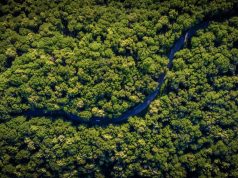INSIGHT by Global Witness
An innovative new tool has been launched by Global Witness that tracks Amazon deforestation linked to the indirect supply chain of the world’s biggest meatpacker, JBS.
The tool, in the form of a twitter bot ‘Brazil Big Beef Watch’ (@bigbeefwatch), alerts followers when deforestation linked to ranches in JBS’s indirect supply chain takes place in the Brazilian state of Pará. When exploring data from 2022, the tool revealed that at least 61 deforestation events occurred, averaging 46 hectares (ha) of land cleared every single week in Pará alone. The yearly total of 2,390 ha of clearance is equivalent to 3,347 football pitches[1].
Recent audits clearly showcase the need for official monitoring of JBS’s suppliers in Brazil. The latest official audits of the meatpacking giant’s direct supply chain in Pará showed that more than one in six cattle bought by the company came from ranches with “irregularities” such as illegal deforestation – despite JBS’s no deforestation agreements with Brazilian prosecutors. And this is just among the farms who supply directly to JBS. Estimates for deforestation among its indirect suppliers are suspected to be far, far worse; conservative estimates for the total deforestation footprint of JBS’ indirect supply chain may be as high 1.5 million ha. Yet these are just estimates, as official audits do not extend to JBS’s indirect supply chain, which the company itself is failing to monitor.
Following these findings, Global Witness has launched the Brazil Big Beef Bot to provide transparent, automatic, and systematic monitoring further down JBS’s supply chain, with the much-needed scrutiny helping to put some numbers on the as yet unknown amount of “rainforest beef” – beef from land that was until recently rainforest – the company sells.
This information will be publicly available, including to JBS’s biggest financial backers, who Global Witness recently called upon to suspend their dealings with the company until it can transparently show its supply chains are deforestation-free.
“Home to countless communities and endangered species, climate critical forests are being destroyed to graze cattle and then sold on international markets. Satellite technology means that those responsible – the big beef companies and their international financial backers – now have nowhere to hide. With this tool, aimed at the biggest beef company on the planet, we’re showing how easy it is for companies (and authorities) to check supply chains for deforestation. If we can do it, so can they. The world does not need any more rainforest beef.
“Action by companies and their financial backers could stop this destruction. Financial institutions with investments in JBS must recognize the vital role they play in averting climate catastrophe, and we urge them to stop backing the company until the issues in its supply chain are resolved. With the launch of this tool there is now simply no excuse that they are not aware of the JBS’s impact in one of the world’s most important ecosystems.”
-Veronica Oakeshott, Head of the Forests Campaign at Global Witness
Developed by Global Witness’s Data Investigations Team, the tool is driven by weekly deforestation alerts published by Mapbiomas. When such an alert is raised, the bot scours through a large volume of cattle transit permit data to identify whether the farm in question forms part of JBS’s indirect supply chain.
To be classified as an indirect supplier, the farm must meet specific criteria, including selling cattle to a direct supplier of JBS multiple times and selling to them since 2020 – but excludes those who have sold cattle directly to JBS. If the bot detects a farm that meets these conditions and coincides with a deforestation alert, it shares this information which is sent out via a tweet.
Oakeshott added: “This incredible new tool moves us one step closer to exposing the true environmental impact of the world’s largest meatpacking company. It is truly shocking that JBS, despite being a massive corporation with revenue rivalling many countries, is failing to track its full supply chain. We hope our new tool provides them with some free advice about where to look to make sure it isn’t chopping down trees faster than the world can eat burgers.”
In response to Global Witness’s request for comment, JBS said that their technical team “found the information provided to be overall scarce and superficial, but a better understanding about the methodology used (databases and information crossing) would be helpful for JBS to provide a more detailed and robust feedback when the data are published”. They described Global Witness’s method of identifying JBS’s indirect suppliers as “confusing and opaque.”
Please find further information about the Global Witness here
| All opinions expressed are those of the author and/or quoted sources. investESG.eu is an independent and neutral platform dedicated to generating debate around ESG investing topics.









